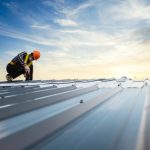Metal Roofing vs. Other Roofing Materials: A Comparison for Commercial Properties
March 14, 2024 4:45 pm Leave your thoughts When it comes to choosing the right roofing material for commercial properties, there are a variety of options to consider. Each roofing material has its own set of advantages and disadvantages, making the decision-making process a critical one for property owners and managers. Two popular choices for commercial roofs are metal roofing and other traditional materials such as asphalt, tile, and EPDM. In this blog post, we’ll compare metal roofing to these other materials, highlighting the key differences and benefits of each to help you make an informed decision for your commercial property.
When it comes to choosing the right roofing material for commercial properties, there are a variety of options to consider. Each roofing material has its own set of advantages and disadvantages, making the decision-making process a critical one for property owners and managers. Two popular choices for commercial roofs are metal roofing and other traditional materials such as asphalt, tile, and EPDM. In this blog post, we’ll compare metal roofing to these other materials, highlighting the key differences and benefits of each to help you make an informed decision for your commercial property.
Metal Roofing: Durability and Longevity
One of the main advantages of metal roofing for commercial properties is its exceptional durability and longevity. Metal roofs are known for their ability to withstand harsh weather conditions, including strong winds, heavy rain, and snow. They are also resistant to fire, mildew, and insects, making them a low-maintenance and long-lasting option for commercial buildings.
Metal roofs can last upwards of 50 years with proper maintenance, significantly longer than other roofing materials such as asphalt shingles and EPDM. This longevity can result in cost savings over time, as metal roofs require fewer repairs and replacements compared to other materials.
Other Roofing Materials: Asphalt, Tile, and EPDM
While metal roofing offers many benefits, other traditional roofing materials also have their own advantages. Asphalt shingles are a popular choice for commercial properties due to their affordability and ease of installation. They come in a variety of colors and styles, making them a versatile option for different building designs.
Tile roofing is another durable option for commercial properties, known for its classic and elegant appearance. Tile roofs are resistant to fire, rot, and insects, and can last up to 50 years with proper maintenance. However, tile roofing can be heavy and more expensive to install compared to other materials.
EPDM (ethylene propylene diene monomer) roofing is a synthetic rubber material commonly used for commercial roofs. EPDM is lightweight, flexible, and easy to install, making it a popular choice for flat or low-slope roofs. It is also resistant to UV rays and can last up to 30 years with proper maintenance.
Environmental Impact and Energy Efficiency
In addition to durability and longevity, another factor to consider when choosing a roofing material for your commercial property is its environmental impact and energy efficiency. Metal roofing is a sustainable option that is highly recyclable and can be made from recycled materials. Metal roofs are also energy-efficient, reflecting solar heat and reducing cooling costs during the summer months.
Asphalt shingles, on the other hand, are non-recyclable and can contribute to landfill waste. They also absorb heat and can increase energy costs for cooling in warmer climates. Tile roofing is environmentally friendly in that it is made from natural materials such as clay or concrete, but it can be heavy and energy-intensive to manufacture and transport.
EPDM roofing is a relatively eco-friendly option compared to other materials, as it is highly durable and requires minimal maintenance over its lifespan. EPDM roofs can also be installed with cool roof coatings to improve energy efficiency and reduce cooling costs.
Cost and Maintenance
When it comes to cost and maintenance considerations, metal roofing is a mid-range option that offers a good balance of upfront costs and long-term savings. While metal roofs may have a higher initial cost than asphalt shingles, they require less maintenance and are less prone to damage, resulting in lower overall lifecycle costs.
Asphalt shingles are one of the most affordable roofing options for commercial properties, making them a popular choice for budget-conscious property owners. However, asphalt shingles have a shorter lifespan than metal roofs and may require more frequent repairs and replacements.
Tile roofing is a high-end option that can be more expensive to install than metal or asphalt shingles. While tile roofs are durable and long-lasting, they can be costly to repair or replace if damaged. EPDM roofing falls in the mid-range in terms of cost and requires minimal maintenance over its lifespan.
Summary
When comparing metal roofing to other traditional roofing materials for commercial properties, it’s essential to consider factors such as durability, longevity, environmental impact, energy efficiency, cost, and maintenance requirements. Metal roofing is a durable and long-lasting option that offers energy efficiency and recyclability, making it a sustainable choice for commercial buildings. However, asphalt shingles, tile roofing, and EPDM roofing also have their own unique benefits and considerations that may make them the right choice for your specific property. By weighing the pros and cons of each material and considering your budget, building design, and climate factors, you can select the roofing material that best meets the needs of your commercial property.
Need a Metal Roofing Supplier in Anchorage, AK?
Superior Products, Inc. has supplied thousands of commercial and residential metal roofing and siding projects throughout Alaska and areas in the lower 48 states. We provide concealed or exposed fasteners, metal insulated roof and wall panels, metal soffits, fascia panels and full wrap flashes, snow control products, metal shingles, and much much more. Call us today for immediate service.
Categorised in: Commercial Roofing, Metal Roofing
This post was written by admin

